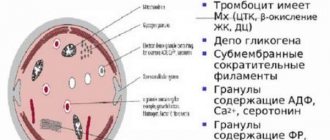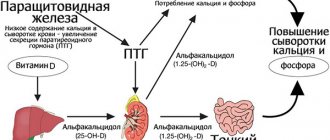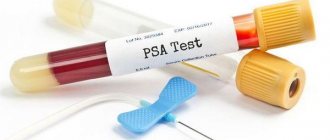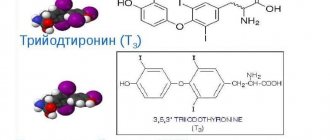When the thyroid gland malfunctions, the normal functioning of the entire body is disrupted.
When the thyroid gland malfunctions, the normal functioning of the entire body is disrupted.
A common problem that can lead to poor health is elevated levels of thyroid-stimulating hormone. This happens especially often during pregnancy. It is necessary to consider how to reduce TSH.
Reasons for the increase in TSH, main clinical signs of the disease
TSH is one of the most important hormones, and increasing its level requires an in-depth assessment of the functioning of the thyroid gland, pituitary gland and hypothalamus. In most cases, it is the dysfunction of the thyroid gland that “pulls” TSH above the required value. This happens due to the peculiarities of the interaction between free T4 (one of the thyroid hormones) and TSH. If the concentration of T4 in the body decreases, the level of TSH increases, and vice versa.
How to understand that the body has reduced thyroid function, i.e. Low T4 hormone levels? In adults, a number of characteristic symptoms are noticeable:
- Increased sensitivity to cold, weight gain - occurs as a result of a decrease in enzyme activity, the level of oxygen consumption by tissues and the rate of general metabolism.
- Mucosal edema (myxedema) is noticeable - in patients, water-salt metabolism is disrupted and this causes water retention, especially in the subcutaneous areas.
- Malfunctions in the functioning of the sense organs - manifests itself in the form of difficulty in nasal breathing, deterioration of hearing and hoarseness of the voice.
- Decreased immunity, disorders of the cardiovascular system, muscles, gastrointestinal tract.
- Complications arise at the level of the nervous system - irritability, lethargy, apathy, drowsiness, panic attacks against the background of tachycardia.
Among the reasons that can provoke an increase in TSH are:
- Endogenous factors - caused by genetic defects in various stages of the formation of thyroid hormones, stages of their movement and interaction with target cell receptors;
- Exogenous factors - combine several components, among them: insufficient iodine intake, the action of substances that compete with iodides or disrupt the production of thyroid hormones, surgical intervention (for tumors or hyperfunction of the thyroid gland).
At the diagnostic stage, it is very important to determine the cause of the disease.
Thus, with insufficient consumption of iodine by the body, hypofunction of the thyroid gland occurs - endemic goiter. During endemic goiter, a low concentration of thyroid hormones in the blood, using a feedback principle, causes an increase in the secretion of thyrotropin. It, in turn, stimulates an increase in the size of the thyroid gland until a balance is restored between the size of the gland itself and the consumption of a small amount of iodine.
This compensatory mechanism balances the amount of thyroid hormones and the level of basal metabolism for some time. Subsequently, the proliferation of connective tissues develops and conditions for hypothyroidism arise. To prevent these conditions, the patient is recommended to enrich food with iodides using iodized salt or take additional pharmaceuticals.
TTG - what does this abbreviation mean?
TSH, or thyroid-stimulating hormone, plays an important role in metabolic processes and regulates the production of thyroxine (T4) and triiodothyronine (T3). Together they are responsible for the following functions:
- regulation of growth, weight, temperature
- protein and retinol synthesis
- normal functioning of hearing and vision organs
- correct intestinal motility
- regulation of the menstrual cycle in women
- activity of the central nervous system and cardiovascular system
TSH ensures the supply of iodine from the blood to the thyroid gland. If it does not work properly, the body often notices a lack of this element and additional intake is prescribed.
https://www.youtube.com/watch?v=8QNAV69-BQ8
A high level of thyrotropin is a direct sign of hypothyroidism and is an indicator that the thyroid gland is not working effectively. The three hormones are closely interrelated. With a lack of T3 and T4, the body gives the pituitary gland a signal to work more actively and TSH increases. When the indicators stabilize, thyroid-stimulating hormone returns to normal. That is, the greater the deficiency, the higher the TSH level.
If there is a lot of thyroxine and triiodothyronine in the blood, they will have a suppressive effect and low TSH will be noted. With a constant lack of thyroid-stimulating hormone, the gland tissue gradually grows. There is an enlargement of the thyroid gland, which is called a goiter.
Ways to influence TSH levels
The goal of treating hypothyroidism is to eliminate the clinical symptoms of the disease, normalize thyroid hormone levels and reduce TSH to normal. For this you can use:
- Correction of nutrition and prescription of iodine-containing drugs - the method is ineffective and is unsuitable for the treatment of serious endocrinological disorders;
- Prescribing hormonal drugs - endocrinologists calculate the required dosage of drugs based on levothyroxine sodium and make recommendations regarding the duration of taking the drug;
- Surgical intervention is prescribed to eliminate tumors.
The main role in the fight against elevated TSH levels is played by replacement therapy, i.e. taking hormones. In order to monitor the effectiveness of treatment, the patient must periodically undergo blood tests. The adequacy of the prescribed dose of the hormonal drug is assessed after 2-3 months from the start of taking the drug.
If during this period it was possible to normalize the TSH level, the next control is recommended to be carried out after 4-6 months. In the future, you should undergo annual monitoring.
Treatment with levothyroxine drugs to lower TSH levels is long-term (sometimes lifelong). The effect of taking these drugs (provided the dose is successfully selected) is noticeable quite quickly, but a significant number of side effects negatively affect the condition of other important systems of the body. And this fact gives rise to a lot of discussions among patients about how to reduce TSH without medications.
Elevated TSH in children
In children, thyrotropin levels are slightly different. For example, in newborns this figure is higher than in an adult. It remains at this level for approximately 5 years. Only in adolescents (after 14 years) do TSH values become similar to those of adults.
In order to avoid misinterpretation, children are advised to simultaneously test for T3 and T4 hormones. After all, deviations from normal values can be a sign not only of problems with the thyroid gland, but also the result of diseases of other organs.
What does high thyrotropin levels mean in children? Deviations in a larger direction occur in approximately the same cases as in adults - decreased thyroid function, taking medications, high physical activity, pathologies of the pituitary gland, etc.
The following symptoms may be a reason to contact an endocrinologist and get tested:
- the child is fat with normal nutrition
- complains of fatigue, drowsiness
- constipation appeared
- the face is puffy
- problems with the menstrual cycle in girls
- learning lag, slow reaction time
- slow growth
- delay in sexual development
All this should be noticed by parents. With hyperthyroidism (increased production of thyroid hormones), the opposite picture may occur: tremors, diarrhea, high nervousness and excitability, anxiety, rapid weight loss. Deviation in any direction is fraught with unpleasant consequences. Hyperthyroidism is not uncommon in children and adolescents.
In order for the doctor to have a complete picture of what is happening, parents must inform him of all signs and suspicions. The specialist will also take into account height and weight indicators, external development. In addition to hormone tests, an ultrasound scan of the thyroid gland is performed. It is necessary to determine whether the organ has changed, whether there are any seals in it.
Medications and products that can help with hypothyroidism
It is impossible to reduce TSH only with the help of nutritional correction or herbs. This is due to the fact that the disease is caused by a failure in the production of hormones, and it is impossible to directly influence it by non-medicinal methods.
At the same time, some herbal teas help improve the general condition of the body, and foods rich in iodine contribute to more efficient functioning of the thyroid gland. If you want to fight the disease using these methods, be sure to consult an endocrinologist about how best to support your thyroid gland without medications.
Usually, doctors advise combining the use of hormonal medications and folk remedies at the stage when it has already been possible to achieve a decrease in TSH levels, and the patient is prescribed a maintenance dose of the hormone.
In any case, independently adjusting the duration of use and dosage of the drug, as well as changing the name of the drug without a doctor’s prescription is strictly prohibited.
Causes and symptoms of increased thyroid-stimulating hormones
It is believed that in a healthy person, the TSH hormone level should be 0.35-4 mU/l. If the level exceeds this norm, a deviation should be considered, in which case the doctor should prescribe specific therapy. The following conditions can contribute to high levels of thyroid hormones:
- Heavy metal poisoning.
- Cancers of the adenohypophysis.
- High accumulation of iodine in the tissues of the thyroid gland.
- Adrenal gland dysfunction.
- Any congenital anomalies.
Also, a high level of TSH and thyroxine (T4) is characteristic of the development of hyperthyroidism, in this case the general condition noticeably worsens, and the functions of internal organs may be impaired. The following symptoms are typical for this disease:
- Poor bowel function is observed, patients often complain of diarrhea and abdominal pain.
- There is a constant increase in body temperature, so you feel hot and sweating.
- The patient may experience nausea.
- Fatigue, malaise, and decreased performance appear.
- Weight loss is observed even with increased appetite.
- The nervous system suffers, which is expressed in excessive irritability, nervousness, and tearfulness. Sleep is disturbed and increased arousal occurs.
- Minor cramps throughout the body and tremors in the hands.
- Menstrual function is disrupted. In women it can lead to infertility, in men there is erectile dysfunction.
If the listed symptoms occur, it is imperative to visit a doctor and undergo an examination. Because high levels of thyroid-stimulating hormones affect increased thyroid function.
Decoctions and infusions: selection of components and treatment regimen
To prepare a decoction, you need to buy medicinal ingredients at the pharmacy in advance. To reduce TSH levels, the following mixtures are suitable:
- Angelica, chamomile flowers, coltsfoot, rosehip, cocklebur and licorice root;
- Elecampane, rowan and cocklebur berries, birch buds;
- Horsetail, flaxseeds, coltsfoot, cocklebur, celandine, Leuzea root;
- St. John's wort, celandine and chicory stems, lingonberry herb, rose hips, dill seeds, cocklebur berries, dandelion rhizomes.
To prepare a decoction, mix the components in equal proportions and grind the resulting mixture. Then you need to take a glass of boiling water for 20 g of the medicinal mixture. Place the resulting mixture in a water bath and heat for about 20 minutes. Then the composition must be poured into a thermos and allowed to brew for 40-60 minutes, strain.
Take the resulting decoction 100 ml 1-1.5 hours before meals 2-3 times a day. The course of therapy must be at least 3 months. Then the patient is recommended to undergo tests for control. And if the results are satisfactory, after a 3-week break you can repeat the course of treatment again or choose a different recommended composition.
In addition to decoctions, infusions help reduce TSH to normal. They should also be used carefully, taking into account the presence of allergic reactions and other individual characteristics. Traditional medicine recommends:
- Persimmon tincture – take 1 part alcohol to 5 parts persimmon juice. Leave for 4 days. Take 1 tablespoon 1 hour before meals 3 times a day.
- Alcohol tincture of hawthorn flowers. To prepare it, mix 20 g of flowers and 200 g of alcohol. Infuse in a dark place for 45 days, strain and take 35 drops 3 times a day.
Clinic for increasing TSH in the blood
People with an increased amount of TSH complain of:
- general weakness;
- nervousness, apathy, poor concentration;
- insomnia;
- disruption of the normal functioning of the gastrointestinal tract, which is manifested by dyspeptic syndrome (decreased appetite, nausea) and stool disorders (constipation);
- swelling and pastiness;
- unjustified sharp increase in body weight;
- constant low body temperature, in rare cases increased;
- pallor of the skin.
Balanced nutrition: what products should be on the menu?
A balanced diet plays an important role in the treatment of elevated TSH levels. Among food products, there are several record holders for the content of vitamins and microelements important for the thyroid gland. If you have concomitant gastrointestinal diseases, please note that some of them are not always easy to digest and may cause discomfort in the abdominal area.
Give preference to natural products, and, if your financial situation allows, those with the “ECO” label. During cooking, choose gentle processing methods to preserve the maximum amount of important substances. So, to reduce the level of TSH in the blood, enrich your diet with the following foods:
- Fish (fatty varieties) and seafood - the role of these foods for endocrinological patients is difficult to overestimate. They enrich the body with omega-3 fatty acids and phosphorus. Of particular value is fish caught in the sea or ocean, and not in artificial reservoirs.
- Seaweed is a valuable supplier of iodine. They can be added to soup, salad or to make sushi.
- Fermented milk products help the digestive system and improve metabolism. To support the body, 1-2 glasses of kefir per day are enough; cottage cheese (medium fat content) should be taken 3 times a week.
- Nuts, seeds, dried fruits are great as a snack, they fill you up well and are easy to digest (subject to moderate consumption).
- Fresh or pureed fruits and berries with sugar. Cranberries, blueberries, currants, and gooseberries are especially useful.
- Vegetables and herbs should be in the diet daily.
- Freshly squeezed juices – to obtain valuable drinks, use only high-quality raw materials.
- Maintain proper drinking regime. Tap water does not have the necessary properties, so use filters to purify it before drinking it. If possible, drink spring or mineral water.
- Honey and beekeeping products also have the necessary therapeutic effect, but you should not abuse them, as they can cause severe allergies.
It is impossible to reduce TSH to normal without following the endocrinologist’s prescriptions, and every patient who really cares about their health should remember this. The thyroid gland does not tolerate mistakes, and any mistakes in its treatment will quickly affect the general condition of the patient.
How to lower TSH: lower without hormones, folk remedies, what to drink
Many people underestimate the role of the endocrine system. Failures in its functioning lead to disruption of the normal functioning of the entire body.
The most common pathology of the endocrine system is diseases of the thyroid gland, which occur with an increase in the level of thyroid-stimulating hormone.
In this article we will talk in detail about the causes and signs of the pathological process, as well as how to reduce TSH.
What does elevated thyroid-stimulating hormone mean?
An increased amount of TSH in the blood is a laboratory syndrome that indicates a malfunction in the hypothalamic-pituitary-thyroid system.
Diseases that occur with an increase in this TSH can be divided into 2 groups.
Primary, where the pathological process occurs due to a reduced level of biologically active substances of the thyroid gland, and secondary are associated with diseases of the hypothalamus and pituitary gland.
The hormone TSH is produced in the pituitary gland. It regulates the levels of thyroid hormones T3 and T4. If it increases, this indicates the presence of hypothyroidism. An increase in TSH occurs when T3 and T4 levels are low.
Most often, thyroid diseases occur in the fair sex. In addition, women usually experience autoimmune damage to the gland, as a result of which antibodies are formed to the cells of their own gland.
Thus, thyroid hormones are reduced.
Causes of increased thyroid-stimulating hormone
The level of TSH in the blood is influenced by many factors. However, one of the most important factors is a person’s age and health status. Normally, its value is 0.35-4 mU/l. Next, we will talk about what factors can provoke an increase in the production of thyroid-stimulating hormone. These include:
- Tumor processes and congenital anomalies of the pituitary gland;
- Congenital anomaly of the thyroid and parathyroid glands;
- Diseases of the adrenal glands, which lead to an increase in the amount of thyroid-stimulating hormone;
- Intoxication from chemicals such as lead;
- After using certain medications (Motilium, Propranolol, Atenolol, Furosemide, Amiodarone);
- Mental illnesses;
- Gallbladder resection;
- Excess iodine in the body caused by excess consumption of food;
- vitamin D deficiency;
- Iron-deficiency anemia;
- predominance of estradiol.
It should be noted that during pregnancy the amount of TSH may increase slightly. This phenomenon is normal and does not require treatment. However, it requires monitoring, since the health of the pregnant woman and the unborn child depends on it. Often their significant increase occurs due to gestosis in the third trimester of pregnancy.
Clinic for increasing TSH in the blood
People with an increased amount of TSH complain of:
- general weakness;
- nervousness, apathy, poor concentration;
- insomnia;
- disruption of the normal functioning of the gastrointestinal tract, which is manifested by dyspeptic syndrome (decreased appetite, nausea) and stool disorders (constipation);
- swelling and pastiness;
- unjustified sharp increase in body weight;
- constant low body temperature, in rare cases increased;
- pallor of the skin.
How to lower your thyroid-stimulating hormone levels
After we have found out the causes and symptoms of increased levels of thyroid-stimulating hormone, we will talk about how to reduce TSH levels. First, you need to consult an endocrinologist and carry out a number of additional laboratory and instrumental diagnostic techniques.
They are necessary in order to determine the root cause of the pathological process in the body and select the most optimal methods for treating this problem.
Basic principles of treatment for elevated TSH:
- If TSH is elevated due to a lack of T3 and T4, then Thyroxine is prescribed. It causes a decrease in the hormone according to the principle of negative feedback.
- If there is a lack of iodine in the body, it is necessary to take medications containing iodine. Its optimal amount allows you to normalize the function of the thyroid gland.
- If the cause of the increase in thyroid-stimulating hormone is a tumor process, then surgical treatment cannot be avoided.
People suffering from endocrine pathology should understand that they will not be able to cure this disease on their own without medical education. TSH levels and medications that correct their levels should be taken very seriously. Because self-medication can lead to a number of serious problems.
Do not take any folk or traditional medicine without first consulting your doctor. There is no need to believe advertising that says: “I drink this miracle herbal remedy, and it helps me normalize the hormonal function of the thyroid gland.”
Since it is impossible to lower TSH using folk remedies alone. This is due to the fact that the plants do not contain substances necessary for the functioning of the thyroid gland and do not have a thyroid-stimulating effect. They have proven themselves well in combination with traditional medications.
You should definitely discuss with your doctor how to lower TSH using folk remedies.
Non-traditional methods of treating thyroid diseases
Next we will talk about how to reduce TSH using folk remedies. As you have already understood, there are no plants that have a specific effect on this disease. Traditional medicine can alleviate symptoms and improve health. It is recommended to drink herbal infusions, which you can easily make yourself or purchase at any pharmacy.
Nutritional supplements
To reduce TSH you may need:
- Vitamin E;
- Iron supplements;
- Vitamin B12 and B9;
- Adrenal Cortex Extract
One of the reasons for the increase in thyroid-stimulating hormone levels may be the predominance of estrogen over progesterone. In this case, the task is to equalize this balance. A number of studies have shown that vitamin E can help with this.
A safe dosage is 400 IU, although studies indicate higher numbers. But without a doctor’s supervision, it’s not worth the risk. Alpha tocopherols should be combined with beta, delta, and gamma tocopherols.
Another cause of low TSH may be iron deficiency anemia. In this case, you will need to replenish your iron level, after which TSH will begin to decrease. The chelated form of iron is optimal for taking; in addition, iron is better absorbed when taking vitamin C at the same time. Therefore, we recommend this iron supplement. Should be taken separately from calcium.
In addition to IDA (iron deficiency anemia), B12-deficiency anemia (B12-DA) also occurs. The reason for its occurrence, as you guessed, is low levels of B12 in the body.
Here we must not forget that vitamin B12 goes in a strong combination with vitamin B9 (folate), taking one without the other can be fraught with new problems.
A dietary supplement was created especially for those who doubt it, containing both vitamins, including iron and vitamin C.
Weakened adrenal glands can also contribute to decreased thyroid function.
And if you experience a constant feeling of anxiety, you are prone to panic attacks, you should pay close attention to the work of the adrenal glands.
You can try to restore their function using adrenal cortex extract made from the adrenal glands of cows. It is a natural building material for a weakened organ.
Fees to lower TSH levels
There are a huge number of herbal remedies that reduce thyroid hormone levels. Next, we will talk about the most popular preparations that reduce hormone levels:
- To prepare the collection, you will need to collect coltsfoot flowers, rose hips, yarrow grass, celandine, as well as licorice and angelica roots in equal quantities. All the above ingredients are poured with boiling water and allowed to brew. After this, the infusion is ready for use.
- The amount of the hormone is well reduced when using pharmaceutical drugs in combination with an infusion based on elecampane root, oregano, birch buds, St. John's wort herb and rowan berries.
- You can prepare a decoction of chamomile flowers, chicory root, rose hips, yarrow herbs and mordovnik.
Decoctions prepared from herbal ingredients are infused for at least 10 minutes. They must be taken half an hour before meals. Typically, the duration of herbal treatment is about 90 days.
Nutrition
People suffering from elevated TSH levels should be very careful about their diet. Patients with elevated levels of thyroid-stimulating hormone are recommended to include rowan and feijoa in their diet. You can also periodically consume 1 teaspoon of dry kelp leaves before bed.
It is recommended to include in the diet:
- foods containing large amounts of iodine;
- fiber-rich fruits and vegetables;
- fatty fish (salmon, herring, herring);
- drinking water at least 2 liters per day.
People suffering from this disease are advised to limit the consumption of refined foods and sweets. You should completely avoid drinking chlorinated water.
Thyroid hormones are interconnected, so you need to look at the problem holistically. If there is a problem with TSH, then there will definitely be a problem with T4 and/or T3. Read more about them here - https://krov.expert/analiz/gormony/t4-svobodnyj-norma-u-zhenshhin.html#h2_8
and here - https://krov.expert/analiz/gormony/gormon-t3-za-chto-otvechaet-u-zhenshhin.html#h2_6
Source: https://krov.expert/zdorove/narodnaya-meditsina/kak-snizit-ttg.html
Diet with high content
Patients are advised to adhere to the basic principles of proper nutrition.
- Avoid fried, salty, spicy foods, canned food, and smoked foods.
- Eliminate alcoholic drinks or sharply limit their quantity.
- Take foods containing soy with caution, as they impair the absorption of thyroxine.
- Include easily digestible foods, herbs, vegetables and fruits in your diet.
- Reduce the consumption of fast carbohydrates and foods that stimulate gastric secretion, hot seasonings and spices.
- Increase poultry, fish and other seafood in your diet.
- Avoid consumption of butter and lard.
Change in TSH norm
— A deficiency or excess of thyroid-stimulating hormone can cause irreversible changes in the body. Tell me, what threatens deviations in hormone concentrations up or down?
Elevated TSH
Elevated TSH levels appear when the thyroid gland is dysfunctional, when the normal secretion of thyroid hormones is disrupted. With their minimum production, TSH, on the contrary, begins to be synthesized in maximum quantities.
The following pathologies may be the reason for the functioning of the thyroid gland and an increase in TSH concentration:
- Pituitary tumors.
- Thyroid gland with inflammation.
- Intoxication with heavy metals.
- Hyperactivity.
- Increased physical activity.
- Surgery in the gallbladder.
- Psychosomatics.
- Adrenal insufficiency.
- Therapy with certain groups of medications - antipsychotics, iodine-based drugs, anticonvulsants.
Low TSH
Reduced levels of the hormone indicate increased production of thyroid hormones T3 and T4.
Such changes can provoke:
- Disruptions in pituitary circulation.
- Lack of nutrition.
- Strict diet.
- Emotional stress.
- Mental disorders.
- Growth of the thyroid gland.











